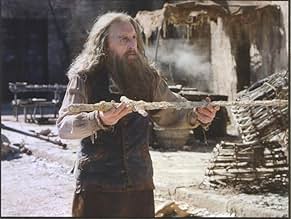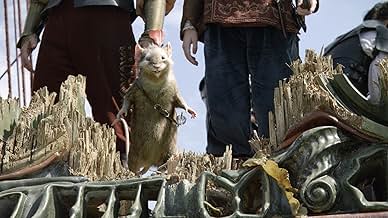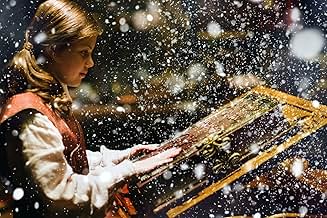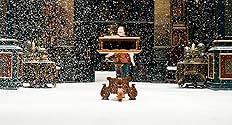As Crônicas de Nárnia: A Viagem do Peregrino da Alvorada
Quando Lúcia e Edmundo Pevensie, acompanhados por seu primo Eustáquio, são transportados para Nárnia, eles se juntam ao Rei Caspian a bordo do navio O Peregrino da Alvorada e partem em uma m... Ler tudoQuando Lúcia e Edmundo Pevensie, acompanhados por seu primo Eustáquio, são transportados para Nárnia, eles se juntam ao Rei Caspian a bordo do navio O Peregrino da Alvorada e partem em uma missão que decidirá o destino da própria Nárnia.Quando Lúcia e Edmundo Pevensie, acompanhados por seu primo Eustáquio, são transportados para Nárnia, eles se juntam ao Rei Caspian a bordo do navio O Peregrino da Alvorada e partem em uma missão que decidirá o destino da própria Nárnia.
- Direção
- Roteiristas
- Artistas
- Prêmios
- 2 vitórias e 19 indicações no total
Avaliações em destaque
First of all, I do not recommend anyone watching this in 3d. It is too dark and the action is just a motion blur. It's dreadful.
As for the film, there is much to enjoy with excellent visual effects, action set pieces (though ruined for me by the 3D) and a couple of stand out characters. But unfortunately there is also much to cringe at in some bouts of terrible dialogue.
The characters of Reepicheep (the kick-ass warrior mouse) and Eustace, (the obnoxious brat cousin) were the most fun with the actor playing Eustace demonstrating excellent comic timing. The relationship between them was funny and touching. And they even brought much needed zest to the action.
But alarmingly, Edmund and Lucy seem to have deteriorated as actors. Some of their emotions are too forced which is a pity. Not sure why, as I would expect them to improve with each film as did the young cast of the Harry Potter movies.
Overall, the story has surprisingly been well adapted considering not a great deal actually happens in the book. But the pacing is good, even though a little episodic. There are much more Christian analogies once again which would please many and irritate others. But I rather like all of the analogies.
I do feel however, that amongst adults, mostly those who enjoyed the Narnia books will enjoy this more than non readers of the books because the story is too bizarre even for a fantasy! But I think most children will enjoy this immensely, regardless if they read the books or not.
With better written dialogue and better handling of the child performances (namely Lucy and Edmund), this could have been a much better film but as its stands its an enjoyable enough entry in this series.
Oh and I will say it again, do not watch this in 3d.
A brief history, for those who aren't familiar with the series. Narnia is a mystical kingdom in a magical world that can only be reached when it is of the greatest need. It is watched over by Aslan the Lion, who comes and goes as he pleases but always chooses champions who can protect Narnia in the face of evil. In the first movie, two brothers and two sisters from our world are brought to Narnia to overthrow a terrifying Witch-Queen. In the second, they help a young prince named Caspian ascend to the throne that his uncle had usurped. While only adolescents in our world, in Narnia these four young men and women had become great heroes, kings and queens of legend.
In this movie, the youngest two, Edmund and Lucy, travel to Narnia to find there is (apparently) no great need for their help. No wars are currently being fought, and King Caspian is now sailing on his ship, the Dawn Treader, to find seven Lords of Narnia whom his uncle had banished years earlier. Accompanying Edmund and Lucy, unwilling, is their cousin Eustace Scrubb, a thoroughly unpleasant boy who had never even read books about magical lands, let alone believed in them. His only delight in life seemed to be annoying others. Naturally, his attitude won him little friendship or sympathy when he found himself dragged along on a magical voyage in a land he'd teased his cousins for "inventing".
The ship's company sails to the east, following the last known course of the seven Lords. Along their way, they battle slave traders, encounter an island full of invisible creatures and buildings, and deal with all sorts of fantastical creatures and enchantments. They find themselves tempted by their greatest desires and threatened by their worst fears, even as they strive to discover the fate of the missing Lords.
The most valiant of the sailors is the brave Sir Reepicheep, a Mouse granted the gift of speech (and a new tail when his old was lost) by Aslan himself. Never one to back away from a fight, Reepicheep has a different motivation for embarking on this journey. As a young Mouse, he was told that he would some day travel to Aslan's Country in person. Delighted to see King Edmund and Queen Lucy once more, he finds it particularly difficult to tolerate Eustace. Reepicheep comments that, if Eustace hadn't been related to them by blood, he might have drawn his sword on the lad more than once (and from a Mouse who has faced dragons, it is no idle threat). Eventually, though, as Eustace is forced to face the reality of life in this strange and dangerous world, the noble Mouse becomes something of a guide to him, and even, oddly enough, a comfort from time to time.
There's certainly enough adventure and danger to create an epic, and the emotional and personal trials that each character faces make for interesting moral and dramatic scenes. However, the main difference between the book and the movie is the nature of the voyage on which the crew of the Dawn Treader embarks. In the movie, more than simply finding the lost Lords, the crew is told by a magician that they must bring the swords of each Lord to Aslan's Table and lay them upon it. Doing so would mean the end to a terrible curse that plagues the isles of the east and threatens to spread to the shores of Narnia in time.
Finding the seven swords grounds the movie more firmly in the epic fantasy genre, but it hardly seems necessary. Adding this element to the quest actually changed the dynamic of it. Certainly, it sharpened the focus of the dangers they faced, making the encounters with spirits and sea serpents seem less random; but it also called for changing the order of certain events, such as the order in which they visited the various islands. Also, it takes the focus off the characters themselves, even as the movie tries to bring their personal battles to the forefront, at times.
These aren't major departures from the book. The same issues are addressed, and the storyline is very similar. In the end, not much was changed, especially not the messages delivered by the Great Lion. That's the important part. The books, written over half a century ago, endure in large part because of the author, C.S. Lewis, and the lessons he hoped to teach through his characters. Like the fables of old, The Chronicles of Narnia have their share of talking animals, but that's just window dressing. What's important is what you can learn from the story itself.
(Originally appeared at http://fourthdayuniverse.com/reports/ )
Lighthearted whimsy is exchanged for somberness. A slow paced voyage is traded for a rapid fire adventure that moves so fast, we cannot enjoy the characters nor the moment. This isn't fantasy, it is a special effects reel. Added negatives include the actors, none of whom (Reepicheep excepted) capture any semblance of the royalty they attempt to portray. The actor playing Caspian is especially dimwitted in playing a king. He seems more like a befuddled commoner who learned a few royal gestures at school somewhere. At no time do you feel nor do his men feel like they are in the presence of a great king (which was the case in the book). The movie takes great liberties with the plot of the book, opting instead for a silly new plot about an evil mist which sucks away slaves in boats. This brings about a couple of new side characters (a father and daughter), neither of whom make much of an impression.
What this movie series need is to RECAPTURE THE MOOD OF THE BOOKS and avoid throwing out the plot for a newer one. They can keep the special effects, but temper them with a story that takes its time and is as entranced with its surroundings as the passengers aboard the Dawn Treader were. Are the producers afraid to elevate the material up to the audience, instead of pandering down to short attention spans? It sure seems so. While taken on its own terms the movie is professionally handled, I guarantee the movie would have stuck in the minds of the audience more if greater pains were taken on a good script and good acting. As it is, you watch the film, leave, and then don't remember much afterward.
"The Chronicles of Narnia: The Voyage of the Dawn Treader" is a good film. It has elements for everyone to enjoy, such as clean humour, excitement, dangers and also psychological elements. The plot is straightforward and easy to understand. It is also filled with excitement, especially the battle with the dragon is quite breathtaking. The plot and the characters engage me a lot. This time, the Pevensies have matured, and hence are a lot less annoying. They even become interesting characters as they battle to overcome their own inadequacies. This subplot is aimed at adults, but it still can be understood by children at face value.
The 3D though, is a lot less thrilling than the film. Most scenes do not have noticeable 3D effects. The scenes that do have 3D are quite underwhelming. There are little scenes in the film that makes use of the 3D technology. I can safely say that watching the 2D version would be just as enjoyable than the 3D version, and you can save a few dollars by doing so.
The film felt like they took the original story, chopped it up, then threw it in a blender with seven magical swords and some ridiculous green mist!
While the film stayed true to main themes of the story, much of the character development and purpose to each of the minor island stories was lost. Unfortunately this meant that most of the magic of the story was lost as well.
I gave the film 6 stars due to the redeeming qualities that were the stunning visuals, some excellent acting (notably by Will Poulter as Eustace), and a beautifully executed final scene.
If you haven't read the book, then you may enjoy this film immensely, but if you are a true Narnia fan, don't go in with very high expectations.
Você sabia?
- CuriosidadesThe drawings of the characters during the end credits are the exact drawings that appeared in the book. This is a tribute to Pauline Baynes, the series' illustrator, who passed away on August 2, 2008, at 85.
- Erros de gravaçãoIn As Crônicas de Nárnia: Príncipe Caspian (2008), Caspian (Ben Barnes) spoke with a pronounced Spanish accent, as did the other Telmarines. In this film, Caspian now speaks with an English accent. This is done purposefully by the filmmakers, who no longer needed to match Caspian's accent to the other Telmarines, so they chose to use the actor's more realistic natural British accent. People's accents change over time in real life as well.
- Citações
Lucy Pevensie: Will you come and visit us in our world?
Aslan: I shall be watching you always.
Lucy Pevensie: How?
Aslan: In your world, I have another name. You must learn to know me by it. That was the very reason why you were brought to Narnia, that by knowing me here for a little, you may know me better there.
- Versões alternativasGerman theatrical version was cut by 76 seconds (primarily the end fight) to secure a "Not under 6" rating. This version was also released on DVD and 2D Blu-ray. However, the 3D Blu-ray release contains the uncut version - in 3D AND 2D.
- Trilhas sonorasLangham Place (Elegie) [London Again (Suite)]
Written by Eric Coates
Performed by New Symphony Orchestra, Eric Coates Conductor
Courtesy of Decca Music Group Limited
Under license from Universal Music Enterprises
Principais escolhas
Detalhes
- Data de lançamento
- Países de origem
- Central de atendimento oficial
- Idioma
- Também conhecido como
- As Crônicas de Nárnia: Viagem do Peregrino da Alvorada
- Locações de filme
- Empresas de produção
- Consulte mais créditos da empresa na IMDbPro
Bilheteria
- Orçamento
- US$ 155.000.000 (estimativa)
- Faturamento bruto nos EUA e Canadá
- US$ 104.386.950
- Fim de semana de estreia nos EUA e Canadá
- US$ 24.005.069
- 12 de dez. de 2010
- Faturamento bruto mundial
- US$ 415.686.217
- Tempo de duração1 hora 53 minutos
- Cor
- Mixagem de som
- Proporção
- 2.39 : 1









































